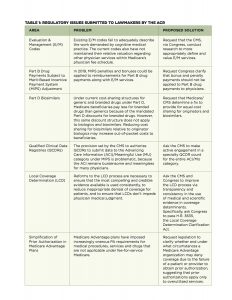While the latest version of the Republican-sponsored healthcare bill once again falters and its prospects of becoming the new law of the land fade, plenty of advocacy work is continuing on behalf of rheumatologists and rheumatology practices.
The ACR, along with multiple partners, has renewed its push for regulatory relief in a number of areas important to the day-to-day functioning of rheumatology practices nationwide. The ACR is a leading member in the new Regulatory Relief Coalition, which—along with the ACR—consists of the American Academy of Dermatology; the American Academy of Ophthalmology; the American Academy of Otolaryngology—Head and Neck Surgery; the American Academy of Neurology; the American Association of Neurological Surgeons/Congress of Neurological Surgeons; the American Society of Clinical Oncology; the American Urological Association; Society for Vascular Surgery; and AMDA—The Society for Post-Acute and Long-Term Care Medicine.
“In these times of change, the ACR is actively pursuing opportunities in Washington, D.C., and committing its resources to make sure the interests of rheumatologists and our patients are represented,” says Angus Worthing, MD, FACP, FACR, a practicing rheumatologist and chair of the ACR’s Government Affairs Committee (GAC).
Dogged by Uncertainty
With Senate Majority Leader Mitch McConnell declaring that repeal efforts will continue, albeit with another delay, uncertainty over potential changes in healthcare delivery will continue to dog the daily lives of clinicians and administrators, and continue to provoke uncertainty and discomfort.
“Rheumatologists, like other physicians, don’t like uncertainty, and not knowing how healthcare is going to be structured is an issue that is overriding everything else,” says Tim Laing, MD, former chair of the ACR’s GAC and current ACR representative to the Cognitive Care Alliance, representing more than 92,000 physicians from eight cognitive specialty societies.
Key Regulatory Issues
Dr. Laing, who was in D.C. advocating on behalf of rheumatologists and patients for the ACR when interviewed for this article, talked about some of the key regulatory issues the ACR is pushing lawmakers to address. Table 1 lists these issues and the action the ACR has taken in letters to and visits with members of the Committee on Ways and Means, Subcommittee on Health and other members of Congress.
Dr. Worthing highlighted the importance of addressing Part B drug payment issues: “Perhaps the most pressing current problem is that the new Medicare reimbursement system, MIPS, appears to threaten to adjust reimbursement on Part B drug costs. This means that rheumatologists could face penalties of as much as 4% of large sums of reimbursement from drug infusions in 2019 and penalties of up to 9% in 2022.


